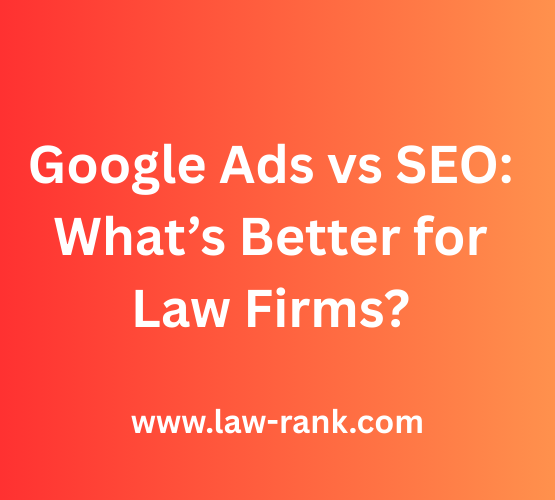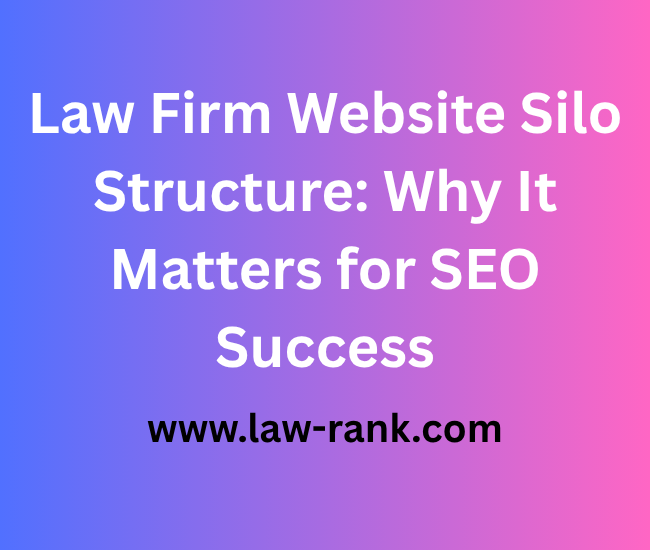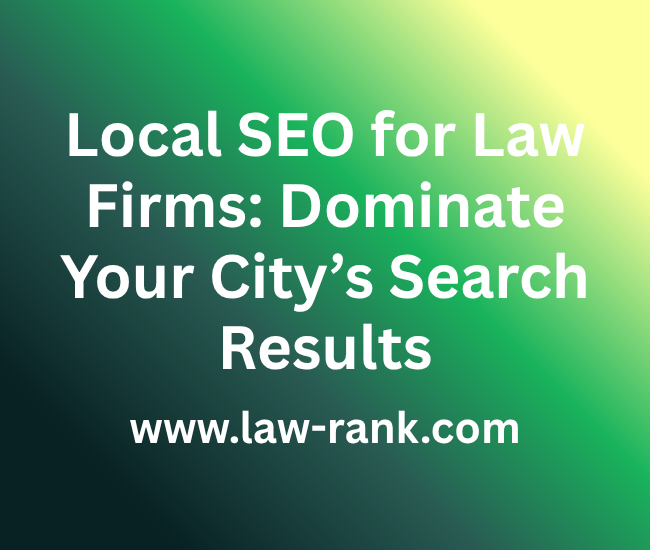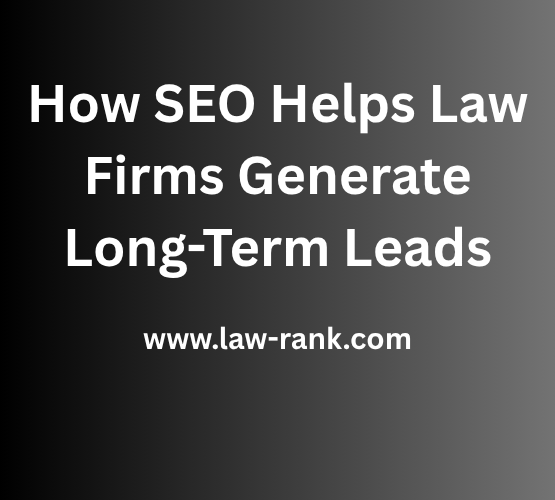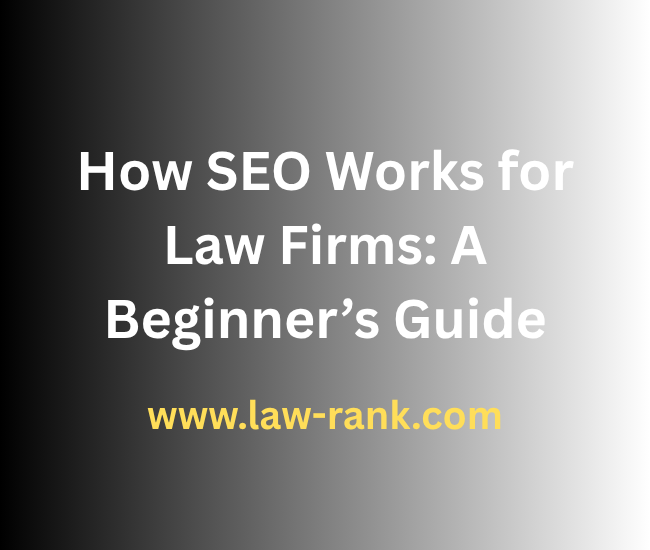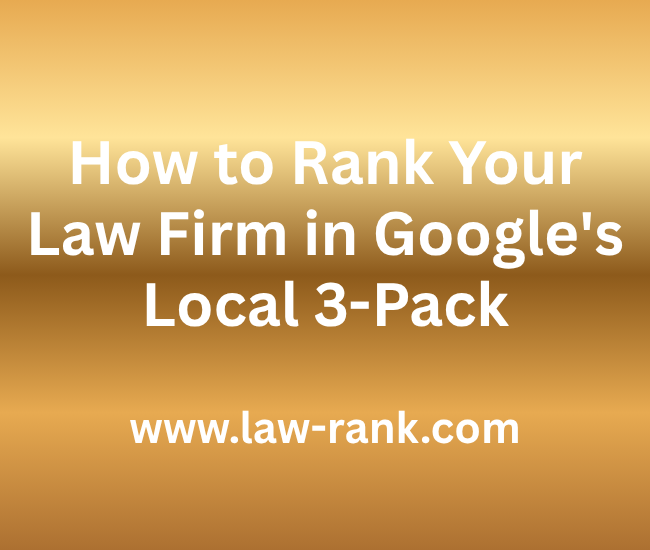Why Law Firms Rely on Digital Marketing
In an industry as competitive as legal services, traditional marketing tactics no longer suffice. Potential clients are searching online for answers, reviews, and representation. As a result, digital marketing has become a critical component of client acquisition for law firms. Whether you’re a solo practitioner or managing a multi-office firm, visibility in search results can determine your caseload. Two dominant strategies stand out in this space: Search Engine Optimization (SEO) and Google Ads (Pay-Per-Click or PPC advertising).
At LawRank, we specialize in helping law firms grow using both SEO and Google Ads. Each method offers distinct advantages and potential drawbacks. Understanding the differences can help law firms allocate resources effectively and maximize case intake.
What Is SEO for Law Firms?
Search Engine Optimization (SEO) is the process of improving a website’s rankings in organic (non-paid) search engine results. For law firms, SEO involves:
- Optimizing on-page content for practice areas (e.g., personal injury, criminal defense)
- Creating informative blog posts that address common legal questions
- Building authoritative backlinks
- Structuring the website for mobile usability and fast loading times
- Managing Google Business Profiles for local search presence
For example, a firm that handles car accident cases in Chicago might target search terms like “Chicago car accident lawyer” or “best personal injury attorney in Illinois.”
What Are Google Ads for Law Firms?
Google Ads, or Pay-Per-Click (PPC) advertising, places your law firm at the top of search engine results for selected keywords. Unlike SEO, these placements are paid and appear above organic listings. When someone clicks on your ad, you pay a fee. Key components include:
- Bidding on high-intent keywords (e.g., “Los Angeles DUI attorney”)
- Writing compelling ad copy that attracts clicks
- Creating optimized landing pages to convert visitors into leads
- Setting geographic, device, and demographic targeting
For example, a family law firm in Dallas might run ads targeting “divorce lawyer Dallas,” showing up at the top of search results instantly.
Pros of SEO for Law Firms
1. Long-Term Return on Investment
Once a site is ranking well, SEO can drive consistent traffic without ongoing ad spend. The cost per lead tends to decrease over time as rankings stabilize.
2. Trust and Credibility
Users often trust organic search results more than paid ads. A strong presence in organic listings signals authority and professionalism.
3. High-Quality Traffic
SEO captures users who are actively researching legal issues. These users often engage with multiple pages, increasing the chance of conversion.
4. Local Visibility
Effective local SEO strategies improve a firm’s chances of showing up in the map pack and local search results, which is critical for location-based services.
5. Brand Authority
Consistent content creation around legal topics builds brand authority and educates potential clients.
Cons of SEO for Law Firms
1. Slow Ramp-Up Time
It can take months to achieve significant ranking improvements, particularly in competitive markets like personal injury or criminal defense.
2. Algorithm Dependency
Search engines regularly update their algorithms. A change can impact rankings, even if the firm has followed best practices.
3. Ongoing Maintenance Required
Maintaining rankings requires continuous content development, link building, and technical optimization.
4. Competitive Barriers
In saturated markets, outranking established firms with strong domain authority can be difficult without a significant investment.
Pros of Google Ads for Law Firms
1. Immediate Results
Google Ads can generate leads as soon as the campaign goes live. This is particularly useful for new firms or those expanding into new markets.
2. Precise Targeting
You can narrow your audience based on location, time of day, device type, and even income level. This allows firms to reach potential clients with high intent.
3. Budget Control
Google Ads allows you to set daily or monthly budgets. You can scale campaigns up or down based on performance.
4. A/B Testing Capabilities
Multiple versions of ads and landing pages can be tested to determine which messaging converts best.
5. Visibility Above Organic Results
Paid listings appear above organic ones, giving your firm top-of-page visibility in competitive search results.
Cons of Google Ads for Law Firms
1. High Cost Per Click
Legal keywords are among the most expensive on Google. In some markets, CPC can exceed $100 for high-intent terms.
2. Click Fraud Risk
Competitors or bots may click on your ads without genuine intent, draining ad budgets without generating leads.
3. Dependency on Budget
Once the budget runs out, the ads disappear, and lead flow stops. Unlike SEO, there is no residual value.
4. Ad Fatigue
Over time, users may become desensitized to repetitive ad formats. Refreshing creative is necessary to maintain performance.
5. Complexity in Management
Effective PPC campaigns require constant monitoring, bid adjustments, and keyword management. Poor execution leads to wasted spend.
When to Use SEO
- Established firms looking for sustainable growth: If your firm has time to invest in long-term marketing, SEO is foundational.
- Firms in mid-to-low competition markets: Smaller regions or niche practices benefit faster from SEO.
- Brand building and education: If you want to inform and engage potential clients, SEO content marketing is effective.
- Supplementing referral traffic: Firms that rely heavily on referrals can use SEO to diversify their traffic sources.
When to Use Google Ads
- Immediate lead generation: New firms or practices launching in new markets can use PPC for quick visibility.
- Testing new practice areas: PPC allows rapid testing of market demand for niche legal services.
- Seasonal or urgent campaigns: If you handle cases with time sensitivity, like DUIs or restraining orders, PPC offers instant exposure.
- Budget flexibility: Firms with flexible or large budgets can allocate funds dynamically to PPC for high-intent queries.
Can SEO and Google Ads Work Together?
Absolutely. Combining both strategies offers a balanced approach to digital marketing.
- Keyword Data Synergy: Use PPC data to inform which keywords to target organically.
- SERP Dominance: Appearing in both paid and organic listings increases click-through rates and brand authority.
- Cross-Channel Retargeting: SEO visitors who don’t convert can be re-engaged through retargeting ads.
- Analytics Insights: Tracking both channels helps refine overall digital strategy based on conversion data.
For example, a criminal defense firm might rank organically for “domestic violence lawyer Chicago” while simultaneously running PPC ads on the same term. This dual presence increases visibility and credibility.
Which Strategy Offers Better ROI for Law Firms?
The answer depends on your timeline, goals, and budget.
- Short-Term ROI: Google Ads often delivers faster results. You can evaluate performance quickly and adjust.
- Long-Term ROI: SEO typically provides better value over time. Once rankings stabilize, cost per lead decreases significantly.
- Combined ROI: Firms that use both channels strategically often see higher lead volumes, improved quality of cases, and stronger brand positioning.
Cost-effectiveness also hinges on execution. Poorly managed SEO or PPC can waste resources. That’s why working with legal marketing experts is essential.
Final Recommendation: Which Is Better for Law Firms?
There’s no one-size-fits-all answer. Instead, law firms should assess:
- Urgency of lead generation
- Budget constraints and flexibility
- Market competition levels
- Internal capacity for content development or ad management
- Current performance and analytics data
In most cases, a hybrid approach yields the best results. SEO provides a stable foundation, while PPC adds agility and reach. Together, they create a comprehensive digital presence capable of supporting both short- and long-term growth.
At LawRank, we specialize in both SEO and Google Ads for law firms. If you’re ready to grow your caseload with a strategy rooted in data and legal industry experience, contact us today for a personalized consultation.
